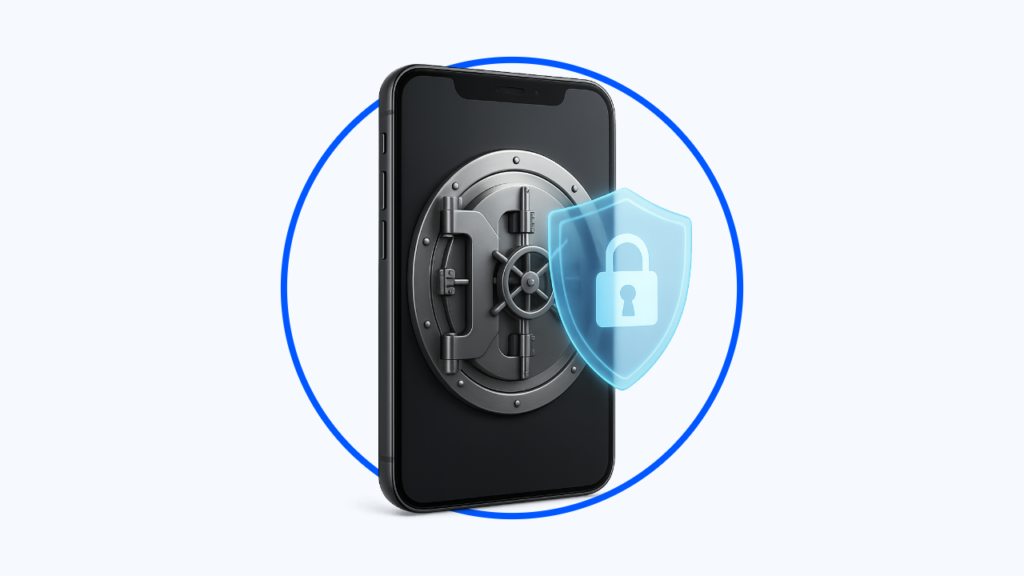Key takeaways
- Verify you’re on legitimate bank websites and apps before entering login information — hackers create convincing fake sites to steal credentials.
- Use strong, unique passwords for each financial account and enable two-factor authentication for an extra layer of security.
- Be skeptical of urgent messages asking for personal information — banks won’t request sensitive data through text or email.
Online banking has become essential for most Americans, with 77% of people preferring to manage their accounts online, according to the American Bankers Association. However, cybercriminals are becoming increasingly sophisticated, using AI to create more convincing phishing attempts and fake banking platforms.
The stakes are high: consumers lost over $12.5 billion to fraud in 2024, representing a 25% increase from the previous year, according to the Federal Trade Commission. Understanding how hackers target bank accounts and practicing protection can help you avoid becoming part of these statistics.
Cybercriminals are constantly evolving their tactics, and what worked to protect you five years ago might not be enough today. The convenience of digital banking is undeniable, but it requires active vigilance from consumers to stay ahead of increasingly sophisticated threats.
— Hanna Horvath, CFP & Bankrate Banking Editor
How to avoid getting hacked: Expert tips from cybersecurity professionals
Bankrate interviewed four leading financial security experts to identify the most effective strategies for protecting your bank accounts from cybercriminals.
Paul Benda, executive vice president, risk, fraud and cybersecurity at the American Bankers Association
- Verify website and app authenticity before logging in. Hackers frequently create fake banking websites and apps that look nearly identical to legitimate ones. “Check your statement or the back of your bank card for the right website, bookmark it, and use that to ensure you are on your financial institution’s official website,” Benda says.
- Download apps only from official sources. Stick to reputable app stores like Apple’s App Store and Google Play. “Trojans are really pernicious,” Benda says. “People need to be careful about what apps they install and where they install them from.” Fraudulent activity often occurs through sideloaded apps downloaded from unofficial sources.
- Don’t respond to suspicious bank texts. If you receive a text claiming to be from your bank and you’re unsure about its legitimacy, don’t reply or click any links. “Instead, verify the message by contacting your bank at the number on the back of your card or through the mobile banking app,” Benda says.
Read more: 5 common types of bank account fraud
Teresa Walsh, chief intelligence officer and managing director, EMEA, at Financial Services Information Sharing and Analysis Center
- Be aware of AI-enhanced scams. Cybercriminals now use artificial intelligence to create more convincing phishing attempts. “Along with newer threats like deepfakes, AI is also being used to mask some of the traditional warning signs of cyber threats,” Walsh says. Scam messages that once contained obvious spelling and grammar errors now appear professionally written.
- Trust your instincts about suspicious activity. “The use of generative AI and machine learning by threat actors continues to develop, as fraudsters and adversaries employ the tools across the entire cyberfraud life cycle,” Walsh says. “If something doesn’t seem right, take a moment to question it.”
- Use unique passwords for all financial accounts. This applies to banks, credit cards, and peer-to-peer payment apps. “If one password becomes compromised, suddenly a cybercriminal can potentially access the full spectrum of your financial information,” Walsh says.
Need a new savings account? See Bankrate’s picks for the best high-yield savings accounts
Donald Korinchak of CyberExperts.com
- Enable two-factor or multifactor authentication. This security measure provides stronger protection by requiring multiple verification methods. “There are three categories of authentication,” Korinchak says. “One, something you know, like a password. Two, something you have, like your cellphone — this is validated when you receive the text code. And three, something you are — biometrics.”
- Set up real-time account alerts. Configure email, text, or app notifications to monitor for fraudulent activity. “In the old days, customers often were unaware of fraud until they got their monthly bank statements,” he says. “Because of this delay, the fraudulent activity could continue for up to four weeks. With alerts, the customer is notified very quickly and can work with the bank to swiftly rectify the issue.”
- Secure your mobile device properly. “Be sure to set up the ability to track your stolen device, disable it and wipe it remotely,” Korinchak says. This prevents thieves from accessing your banking apps if your phone is lost or stolen.
Eric Kraus, vice president of fraud, risk, and compliance at FIS, a fintech company
- Be skeptical of urgent messages requesting information. “Consumers should never respond to unknown messages and embedded web links,” Kraus says. “Everyone should understand your bank or credit union will not contact you asking for sensitive information they already have, such as your account number.” Be particularly wary of messages creating false urgency around requests.
- Monitor all your financial accounts actively. “Timely notification of account activity can help consumers identify suspicious activity quickly,” Kraus says. He recommends monitoring bank accounts, online shopping accounts, and digital wallets. Setting spending controls and limits can also help detect unauthorized activity.
- Limit personal information sharing on social media. “Everyone wants to tell everyone in the world about every little personal thing in their life,” Kraus says. “Be cognizant of not oversharing.” The more personal data hackers collect about you, the easier it becomes for them to access your accounts or answer security questions.
Explore secure banking options: Bankrate’s best online checking accounts offer advanced security features and convenient fraud monitoring tools.
Additional quick tips to protect your bank accounts
Beyond the advice from our expert panel, some additional security measures can further strengthen your account protection.
- Avoid public Wi-Fi for banking. Never access your bank accounts on public wireless networks at coffee shops, airports, or hotels. These networks are often unsecured and can be monitored by cybercriminals. If you must bank while traveling, use your mobile data connection or a trusted VPN service.
- Keep your software updated. Install security updates for your devices, browsers, and banking apps as soon as they become available. These updates often include important security patches that protect against newly discovered vulnerabilities.
- Report lost or stolen cards immediately. Contact your bank right away if your debit or credit card goes missing. Most banks offer 24/7 fraud hotlines and can freeze your accounts within minutes to prevent unauthorized use.
- Review account statements regularly. Don’t rely solely on automated alerts. Check your account statements monthly for any transactions you don’t recognize, no matter how small. Fraudsters sometimes test accounts with tiny transactions before attempting larger thefts.
What to do if your account is compromised
Despite your best efforts, account breaches can still occur. Knowing how to respond quickly can minimize damage and help you recover faster.
- Contact your bank as soon as you notice suspicious activity. You likely won’t have to wait — some banks allow you to lock your card online in addition to having 24/7 fraud service by phone.
- Change your passwords. Make sure you change them for all financial accounts, especially if you’ve been reusing passwords across multiple sites. Use this opportunity to implement unique, strong passwords for each account.
- Monitor your credit reports. Check for any new accounts or credit inquiries you didn’t initiate. You can get free credit reports from all three major bureaus at annualcreditreport.com.
- Document everything related to the fraud. Include when you discovered it, what actions you took, and any communications with your bank. This documentation can be crucial for resolving disputes and recovering losses.
Related reading: What to do if you become a victim of identity theft.
Bottom line
Protecting your bank accounts from hackers requires ongoing vigilance and a multi-layered approach to security. Small, consistent security habits make the biggest difference. Verifying website authenticity, using unique passwords, enabling two-factor authentication and staying alert to suspicious communications can prevent most common attacks.
Remember that your bank will never ask for sensitive information through unsolicited emails, texts, or phone calls. When in doubt, contact your bank directly using the number on your card or app rather than responding to questionable messages.
Why we ask for feedback
Your feedback helps us improve our content and services. It takes less than a minute to
complete.
Your responses are anonymous and will only be used for improving our website.
Help us improve our content
Read the full article here

















